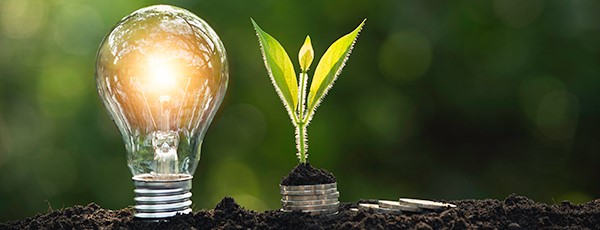Climate Change
Climate Change Countermeasure Targets
In light of increasing public awareness and expectations for a decarbonized society, we have also set FY2035 targets, including efforts to decarbonize thermal energy—specifically, a 60% reduction in Scope 1+2 emissions compared with FY2019.
*3 Science-based Targets (SBTs): Emission reduction targets based on scientific evidence

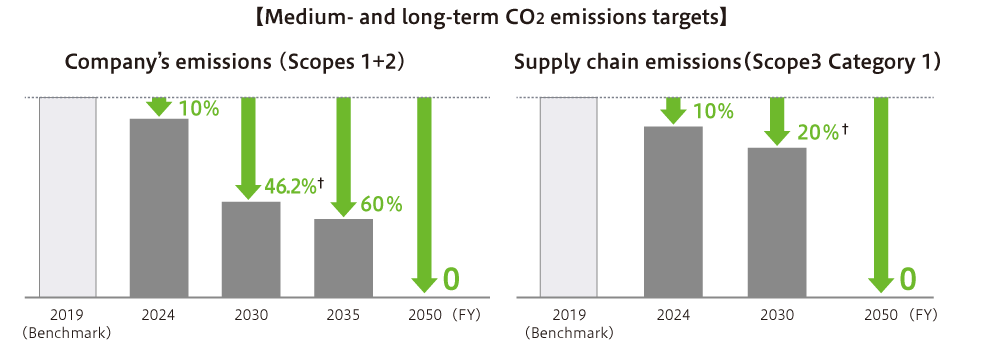
Climate Change Initiatives
Initiatives for Scopes 1 and 2
To achieve the FY2030 targets, we are promoting various energy-saving and low-carbon measures, such as the introduction and renewal of highly efficient equipment, and are sequentially introducing renewable energy-derived electricity, with a focus on SHIONOGI’s major sites, such as plants and research laboratories, to reduce CO2 emissions. In FY2024, we achieved a 23.3% reduction in Scopes 1 and 2 combined compared with FY2019, exceeding the target of a 21% reduction.
Owing to the early implementation of renewable energy-derived electricity at the Shionogi Pharmaceutical Research Center (SPRC), originally scheduled for FY2025 but completed in FY2023, we significantly surpassed the interim target of a 10% reduction set in the “SHIONOGI Group EHS Action Targets” for FY2024 and achieved the standard reduction target under the SBT (an annual reduction of 4.2%, equivalent to a 21% reduction by FY2024 compared with FY2019).
In FY2024, following the introduction plan for SHIONOGI’s major sites, renewable energy-derived electricity was newly introduced to the Settsu Plant of Shionogi Pharma Co., Ltd., which handles SHIONOGI’s production functions. Including the major sites of Shionogi & Co., Ltd. (Head Office Building, Aburahi Research Center, CMC Research Innovation Center [CRIC], and Pharmaceutical Research Center [SPRC]), where the introduction has already been completed, the overall introduction rate has significantly increased to 55.8%. Going forward, we will continue phased implementation at the remaining plants of Shionogi Pharma Co., Ltd., aiming to complete the introduction at all major sites by 2030.
Additionally, to achieve the FY2035 targets and carbon neutrality by 2050, we have initiated efforts to decarbonize thermal energy—such as electrification, hydrogenation, and the introduction of e-methane and e-fuel*—primarily at the plants of Shionogi Pharma Co., Ltd., which have high Scope 1 emissions. To help realize a decarbonized society, SHIONOGI is also intensifying efforts to expand hydrogen utilization, including participation in the Japan Hydrogen Association (JH2A) and investment in hydrogen funds.
* Artificially synthesized fuels (e-methane: gaseous fuel, e-fuel: liquid fuel) using hydrogen (H2) and carbon dioxide (CO2) as raw materials. These are alternative fuels with virtually zero CO2 emissions, as they are synthesized using H2 produced from renewable energy-derived electricity and CO2 recovered from the atmosphere or other sources.
Achievements and Plans for Introducing Renewable Energy-derived Electricity
Fiscal year of introduction |
Site |
Company name |
Status |
|---|---|---|---|
FY2021 |
Head Office |
Shionogi & Co., Ltd. |
Completed |
FY2022 |
Aburahi Research Center |
Shionogi & Co., Ltd. |
Completed |
FY2023 |
Shionogi CMC Research Innovation Center, Shionogi Pharmaceutical Research Center (SPRC) |
Shionogi & Co., Ltd. |
Completed |
Amagasaki Office |
Shionogi Pharma Co., Ltd. |
Completed |
|
FY2024 |
Settsu Plant |
Shionogi Pharma Co., Ltd. |
Scheduled |
FY2025 |
Kanegasaki Plant (25%)* |
Shionogi Pharma Co., Ltd. |
Scheduled |
FY2026 |
Kanegasaki Plant (50%) * , Tokushima Plant |
Shionogi Pharma Co., Ltd. |
Scheduled |
FY2027 |
Kanegasaki Plant (100%)*, |
Shionogi Pharma Co., Ltd. |
Scheduled |
FY2028 |
Akita Plant |
UMN Pharma Inc. |
Scheduled |
FY2029 |
Itami Plant |
Shionogi Pharma Co., Ltd. |
Scheduled |
FY2030 |
Nanjing Plant |
Nanjing Chang’ao Pharmaceutical Co., Ltd. |
Scheduled |
* Ratio of Renewable Energy-derived Electricity Introduced
As part of our efforts to improve energy efficiency, SHIONOGI has set targets to increase energy intensity (energy use per unit of output) by 1% annually and to introduce highly energy-efficient equipment. In addition to reducing the overall energy consumption through the installation of such equipment, we are continuously reviewing equipment operation methods to enhance efficiency.
In FY2024, although total energy consumption decreased compared with FY2023, the energy intensity denominator declined because of the consolidation and closure of offices, resulting in an increase in energy intensity. Furthermore, owing to increased business activities aimed at achieving the STS2030 Revision—including those related to COVID-19—energy consumption continued to plateau at a high level, and we were unable to meet the annual target.
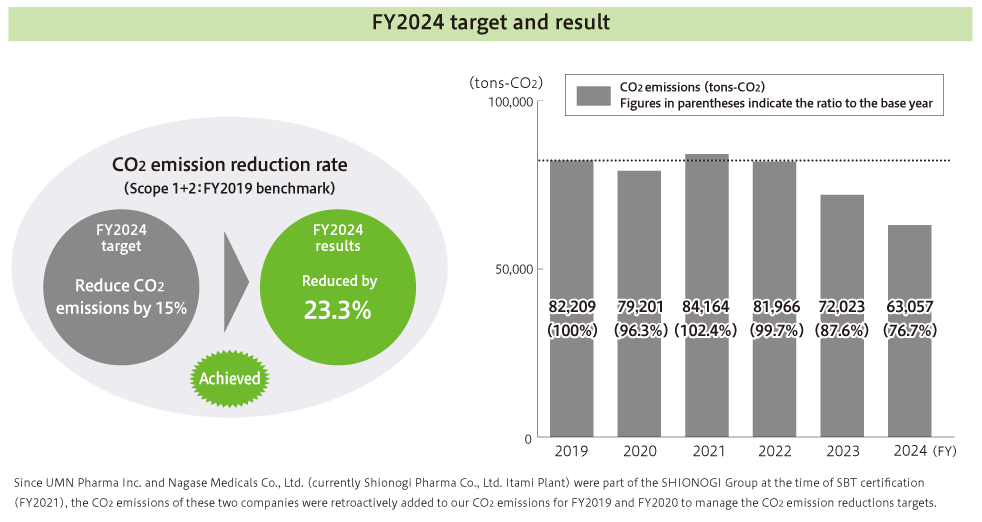
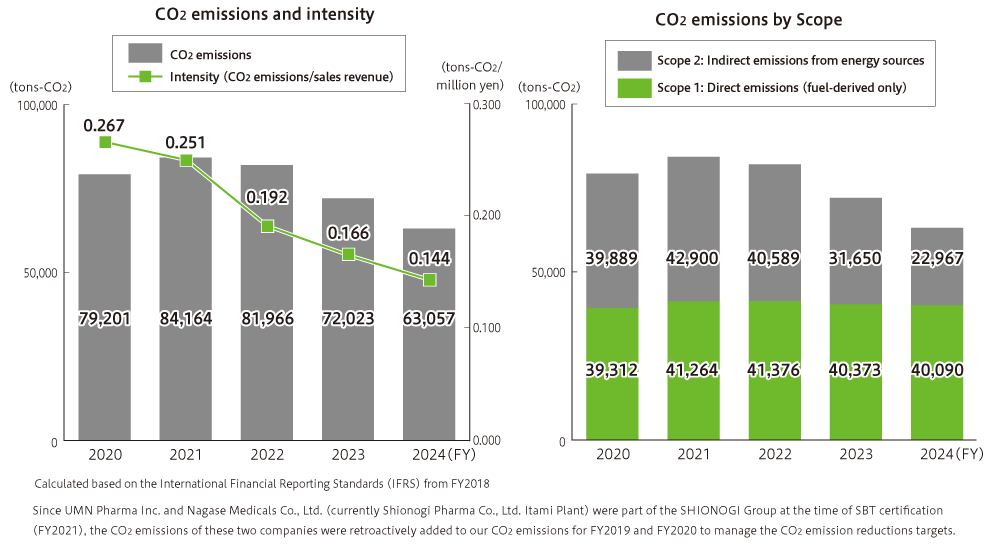
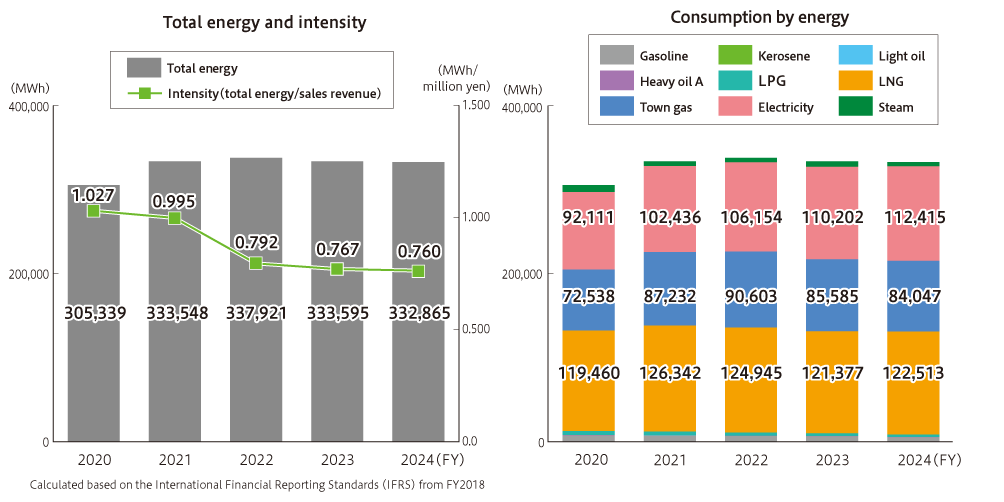
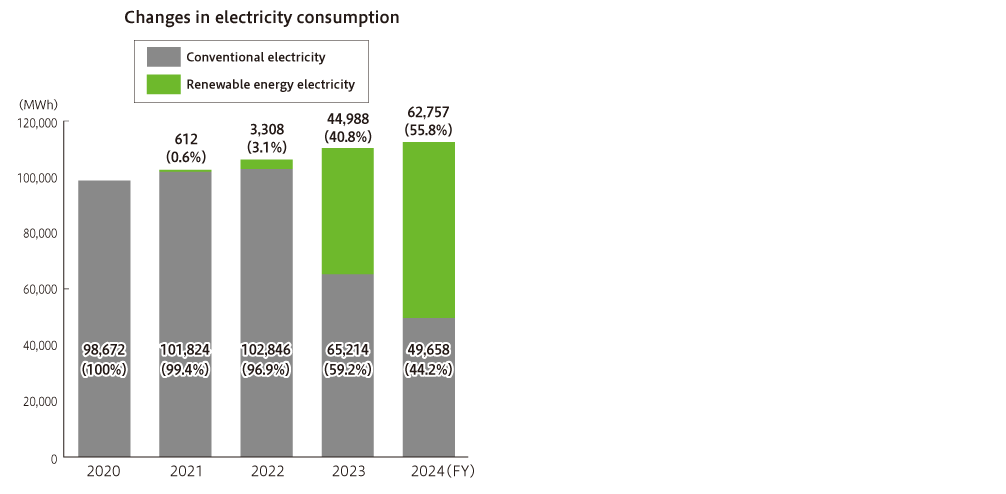
Vehicles for Sales Activities
Because of the spread of the COVID-19 pandemic and the promotion of digital transformation (DX) in medical information provision activities, the proportion of medical representatives (MRs) working remotely has been increasing. As a result, fuel consumption by vehicles for sales activities in FY2024 remained lower than in FY2019, before the pandemic.
Furthermore, regarding the reduction of CO2 and exhaust gas emissions through the conversion of vehicles loaned to MRs to hybrid models, this transition was successfully completed for all vehicles for sales activities in FY2022.
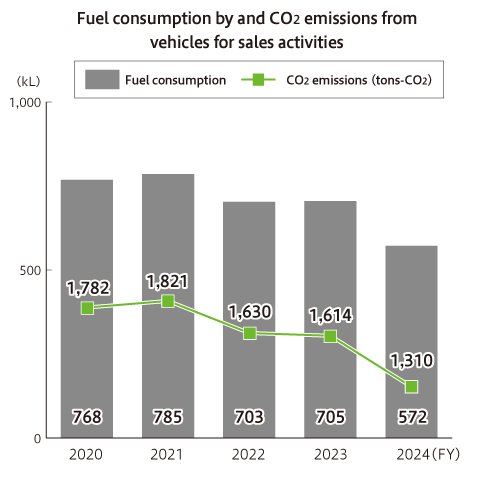
Scope 3 Reduction Initiatives
Among SHIONOGI’s Scope 3 emissions, Category 1: Purchased goods and services accounts for more than 50% of the total. For this category, we have prioritized the establishment of medium-term targets and are actively promoting the consideration and implementation of reduction measures.
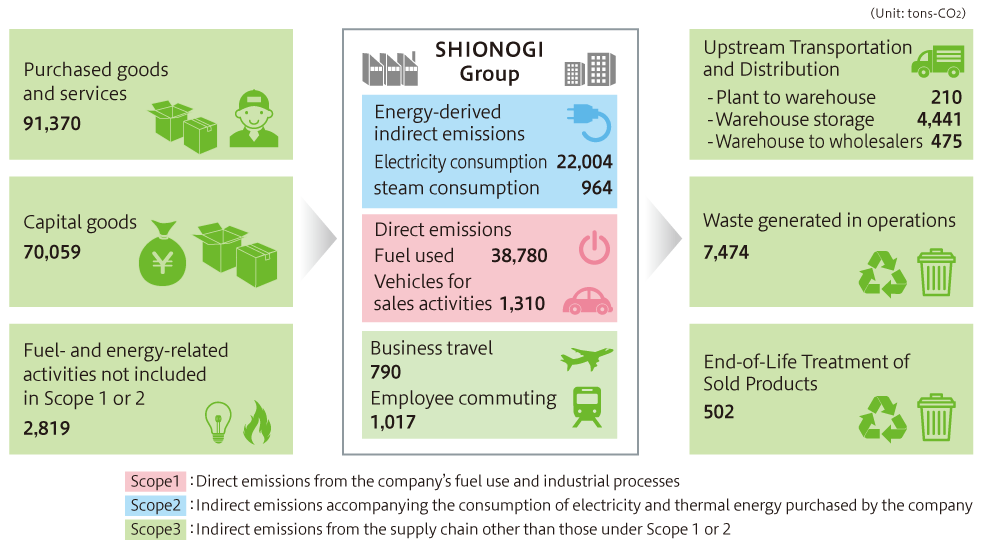
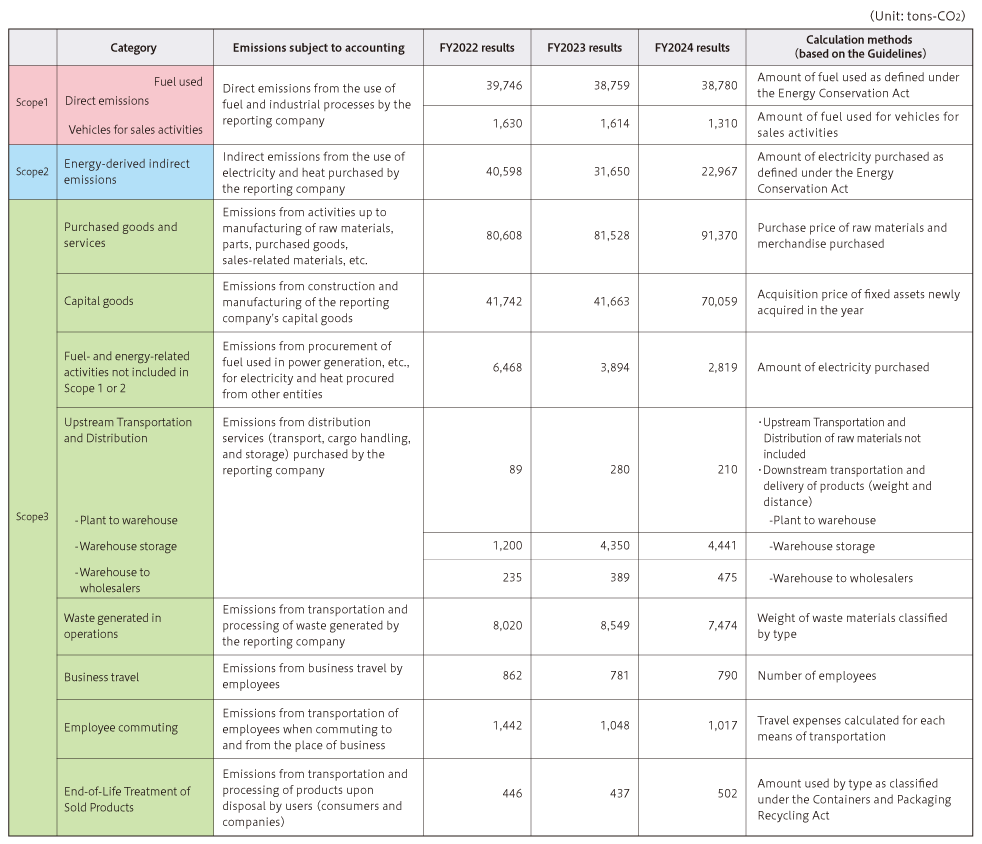
In FY2021 (corresponding to Reiwa 3), SHIONOGI participated in the “Model Project for Supporting Achievement of the Decarbonization Targets of the Entire Supply Chain” of the Ministry of the Environment. Based on the CO2 reduction measures expressed through this project, we are establishing a collaborative framework that includes Group companies to promote supplier engagement and implement the supply chain engagement process*4.
Specifically, we are conducting supplier engagement activities such as confirming the status of CO2 reduction efforts through company-specific questionnaires for top suppliers by purchase amount, holding briefing sessions to promote understanding of SHIONOGI’s climate change policy, and organizing study sessions on Scope 3 emission calculation methods. These efforts support suppliers in reducing their greenhouse gas emissions and provide support for GHG emission disclosure.
In FY2024, we conducted supplier engagement activities with the top 11 suppliers by purchase amount, including explanations of decarbonization initiatives in the pharmaceutical industry and confirmation of CO2 reduction efforts via questionnaires.
Going forward, we will select key suppliers with a greater impact on CO2 emissions and provide prioritized requests and support for reduction.
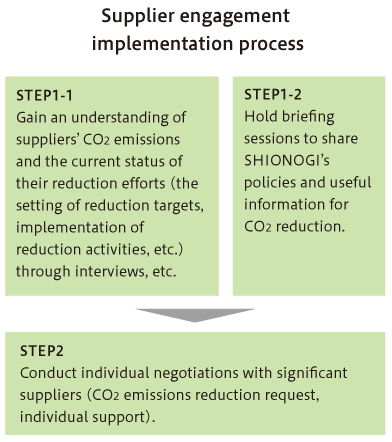
External Engagement in Climate Change Initiatives
CDP Climate Change 2024: A List Company for 3 Consecutive Years and Supplier Engagement Leader for 5 Consecutive Years
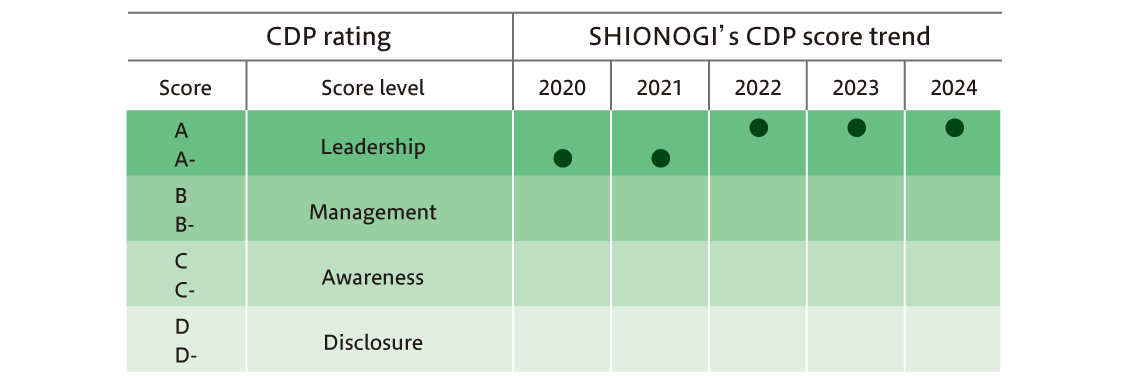
CDP is a non-profit organization that encourages companies and municipalities to disclose environmental information—including climate change, water resource protection, and forest conservation—based on requests from institutional investors and major purchasers. Through this disclosure, CDP promotes environmental action and has become one of the world’s leading environmental data platforms.
Support for the Japan Climate Initiative (JCI) Messages
The JCI is a network that aims to realize a decarbonized society by strengthening information dissemination and dialogue among companies, local governments, and NGOs actively engaged in climate action in Japan. Since joining JCI in April 2021, SHIONOGI has endorsed all five messages issued by JCI to the Japanese government.
“JCI Message: Calling on the Japanese government to set an ambitious 2035 target aligned with the 1.5°C goal” (external link).
SHIONOGI has set medium- and long-term targets, including SBTs, and is working daily to reduce CO2 emissions. These efforts align with our decarbonization policy, which aims for carbon neutrality by 2050, and we fully support the JCI message.
Addressing AMR: A Concern Worsened by Climate Change
SHIONOGI’s initiatives to combat Antimicrobial Resistance (AMR) have been featured on the “Climate Change Adaptation Information Platform (A-PLAT)” operated by the National Institute for Environmental Studies, Japan.
For more details, please refer to our [AMR page] (external link).

